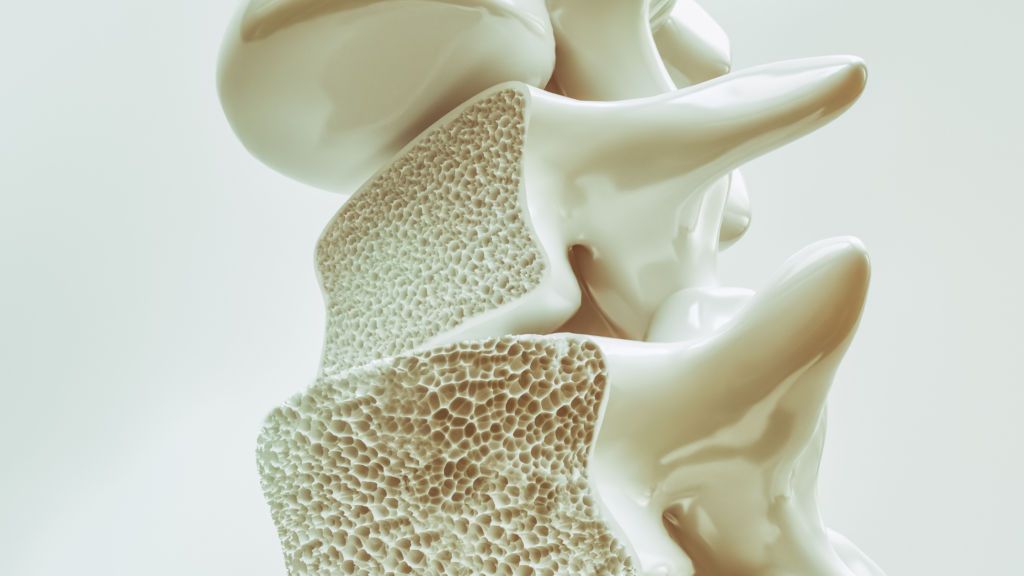
Osteoporosis is a disease you get when you lose bone faster than you make it. “Osteo” means bone, and “porosis” means porous (full of holes). The bone loss of osteoporosis makes your bones weak, brittle, and fracture easily.
You probably won’t have any symptoms of early-stage osteoporosis. Once your bones get weak enough, you might start having back pain from fractured or collapsed vertebrae. You may also start leaning forward in a stooped position and measure an inch or two less than before your bone loss.
If you think of your body as a building, your bones are the framing. Without strong bones, the whole thing would collapse. And that’s a good analogy for what happens when we don’t take good care of our bones. Over time, the body loses more and more bone, until we develop osteoporosis and it “collapses,” in the form of bones fracturing.
Sometimes a bone fracture is the first way you know you have osteoporosis. Fractures can happen in any bone but are most common in your hip, wrist, and spine. It doesn’t take a fall to cause a fracture in weak bones. You can get one climbing stairs, lifting heavy objects, or even leaning forward. These kinds of fractures can cause long-term chronic health problems.
Here are the tips to fight back with OSTEOPOROSIS!
Nutrition for Strong Bones
If you want to build stronger bones, you need three key elements: calcium, protein, and vitamin D. Bones are largely made up of a protein — collagen — bound together by calcium and other trace minerals). Vitamin D helps your body absorb calcium so it can do its job building strong bones.
Exercise Your Right to Strong Bones
One way to see just how important exercise is to bone health is to look at what happens to bone strength when people don’t exercise.
People who have been put on bed rest, people who undergo limb immobilizations, and astronauts, who have very reduced physical activity because of the minimal actions of gravity and muscles pulling on the bone — they all see a rapid and profound effect on the skeletal system.
KEEP YOUR STOMACH ACID
Many people are on acid-blocking drugs, such as Nexium, Protonix, Prevacid, Tagamet, and Zantac, for problems such as heartburn and hiatal hernia. Stomach acid is necessary to absorb minerals such as calcium, magnesium, and zinc. Blocking stomach acid significantly increases the risk of osteoporosis.
These drugs were meant to be used for six to eight weeks at a time, not for years at a time! In fact, most heartburn symptoms are not due to excess stomach acid. Two-thirds of the patients on acid-blocking agents have too little stomach acid, not too much.
REDUCE STRESS
Stress raises cortisol levels. If cortisol levels are high for long periods of time it can cause bone loss. Cortisol antagonizes insulin and leads to insulin resistance, eventually raising the blood sugar and causing calcium loss in the urine. As little as 25 teaspoons of sugar can cause calcium to be lost in the urine. Stress reduction can include specific activities aimed at invoking the “relaxation response” such as yoga, tai chi, meditation, massage and prayer.
PHYSICAL THERAPY
Physical therapy has great benefits to prevent the onset of osteoporosis. Physiotherapy can help you strengthen your bones, as well as your muscles. It can prevent bone thinning, reduce falls, and help you manage any pain. provide appropriate weight-bearing exercises to help improve bone density issues.
Physical therapy is an effective non-surgical treatment for osteoporosis that may help restore healthy movement, function, and bone strength. A physical therapist will teach you exercises for bone health and ways to manage your daily activities so you’ll lessen your chances of having an osteoporosis-related fracture.
Reach out for a free phone consultation.
Helping you achieve a pain-free quality of life is my only goal and armed with 20 years of experience and seeing 100 plus patients every week through my clinics has given me invaluable experience and knowledge in treating patients with chronic and injuries.
I have treated my patients with a 100% success rate. Feel free to give us a ring at 089 273 4307 or email us at donkelly012@gmail.com


